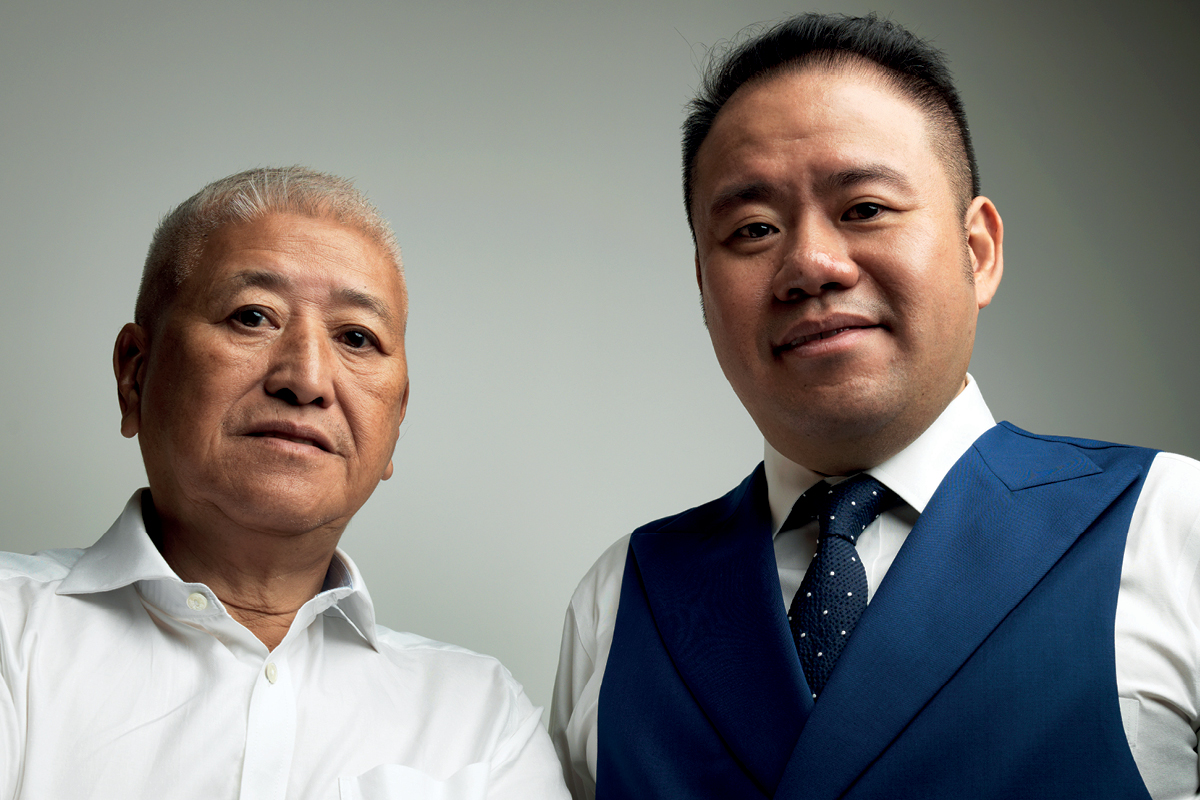David Chan has a strong sense of responsibility. It impacts him so much that his mission and purpose have formed a psychological alarm clock, enabling him to wake up early and do things consciously every morning. This enthusiasm for PCCS Group is what motivates David to construct and sustain the family-run apparel and textile business.

“According to the norms of Chaozhou people, I will be one of the heirs of this business,” David explains. “But my father always held the belief that the position is only right for the most capable person. Since my childhood, he set a lot of requirements and expectations for me.”
David started to help out his father, Group Managing Director Chan Choo Sing, at a young age. He participated in holiday work, packaging products with workers and inspecting construction sites with his father and uncles. “Now, I also work with my brother Edmund Chan and many others who are not from our family to manage PCCS.”
The origin of PCCS Group traces back to 1973 when founders Chan Choo Sing and Chan Kok Hiang made the bold step of investing in three sets of second-hand sewing machines. The goal at the time was to manufacture garments in Batu Pahat, Malaysia.
The business grew, and PCCS now makes apparels, emblems, embroidered logos and elastic bands for brands such as Puma, Decathlon and Macron. It also prints labels and stickers. One of the highlights for the business was back in 1995 when the PCCS Group was listed on the main board of the Kuala Lumpur Stock Exchange in Malaysia.
As the Deputy Group General Manager of the company for the past 10 years, David says he is striving to optimise the business model further and evolve it into a world-class enterprise. “Although we will not be one of the top 500 enterprises in the world, we can be one that can survive for 500 years.”
“Although I aim high, I take a solid and step-by-step approach to reach the target.”
For the next five years, David is intending to focus solely on optimisation. He explains that this includes cooperating with upstream industries and pairing or stepping into different sectors so that the company can develop a business model that further interests’ investors.
“I will also optimise the company’s talent, because as long as we have the ability to continuously attract more and better talent and uphold the management of positions, then the enterprise could survive for 500 years,” David stresses, adding, “Although I aim high, I take a solid and step-by-step approach to reach the target.”
After graduating with a Bachelor of Commerce from Melbourne’s Monash University in Australia in 2002, David started working as a marketing executive at the Group’s Malaysia factory. He was then promoted to Group Marketing Manager in 2004, where he was responsible for developing products and taking orders for factories in Malaysia and Cambodia. Then in 2006, came his big break. David was named General Manager for SGL, a subsidiary of PCCS.

“During the economic crisis in 2008, I temporarily led the Group’s corporate office as Deputy Group General Manager,” he says. “We were supposed to hire a Group General Manager but, during the crisis, it was hard to find someone suitable.
The turbulence was managed by restructuring the business and selling some of the companies and their assets. We also adjusted the business strategy.” After the move, PCCS started to turn around and three years later, the business saw growth.
Throughout David’s tenure, and the financial crisis, a few leadership and business lessons were learned. “We should pay attention to the recruitment process and find the right person, rather than simply fill the vacancy and then brainwash the candidate afterwards,” he shares.
“Try to recruit people with the same vision, goals and values as you. And, as a successful leader, you should be able to set a good example, not avoid responsibility and allow subordinates to make mistakes.”
The most important lesson is that a leader needs to have the ability to solve and prevent problems. Successful leaders need to be able to make decisive decisions in critical moments when leading a team.
“Thanks to my father’s early efforts, the company now has a very cohesive team, including countless colleagues who have stayed with PCCS for more than 10 years,” David notes.
“Additionally, there are many new young and enterprising people who have joined in recent years. I love going to work every day. At PCCS, there are a group of partners who love me and share the same vision as me. Therefore, working with them not only feels invigorating, but they inspire and improve me a little every day.”
PCCS insights
Since its inception, PCCS Group has continued its growth in Asia by building factories and expanding its services.
In 1997, PCCS ventured into the printing and embroidery industry in Cambodia as a complement to its business. A new factory was built with much investment going towards new machines such as thermal transfer, laminating, offset printing, watermarks, embroidery and more.
In 2005, the business successfully gained a foothold in China through the manufacturing of sport attire. In 2007, PCCS further expanded in Cambodia, where it has continued to grow steadily and now has around 3,000 workers.
Mega Label is the label and packaging part of the business, and a major investment. According to PCCS, “This business segment is moving fast and has grown from strength to strength.”
In 2000, Mega Label set up its first factory outside the southern region of Malaysia and in 2012, the company set up its first factory outside Malaysia, which is in Phnom Penh, Cambodia.
Alongside his team, David also thrives on engagement with positive people. He says this provides him with a positive mindset. And when the stress of work gets too much, David prefers to stay active and learn new skills. A few of his recently mastered skills include sailing and flying a single-engine aircraft. He is also a passionate traveller who enjoys exploring new places.
Sharing the long-term vision for the business, David says PCCS Group intends to be a great platform with happy stakeholders. “Stakeholders refers to customers, employees, employers, shareholders and suppliers,” he explains.
“We are committed to investing our money and resources to create a better and sustainable world. We attach great importance to craftsmanship and have a slogan, which is to improve a little every day.”
“When I see that the company has changed other people’s lives or it has helped make people successful, I have a special sense of achievement.”
And “development and innovation are always on the road”, David adds, meaning growth and self-improvement never need to stop. The group has more than 4,000 employees, and at the back of David’s mind is the constant thought of opportunity. He says that doing this business well benefits many families, including his own.
“I want to embrace this platform, cherish it, and uphold my father’s spirit of hard work and a people-oriented mindset,” he enthuses. “I want to continue and expand my father’s ideal and create a better life for more people. When I see that the company has changed other people’s lives or it has helped make people successful, I have a special sense of achievement.”


